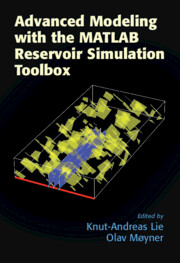Book contents
- Frontmatter
- Contents
- List of Contributors
- Preface
- Acknowledgments
- Navigating the Book and the MRST Modules
- Part I Grid Generation, Discretizations, and Solvers
- Part II Rapid Prototyping and Accelerated Computation
- Part III Modeling of New Physical Processes
- 7 Using State Functions and MRST’ls AD-OO Framework to Implement Simulators for Chemical EOR
- 8 Compositional Simulation with the AD-OO Framework
- 9 Embedded Discrete Fracture Models
- 10 Numerical Modeling of Fractured Unconventional Oil
- 11 A Unified Framework for Flow Simulation in Fractured Reservoirs
- 12 Simulation of Geothermal Systems Using MRST
- 13 A Finite-Volume-Based Module for Unsaturated Poroelasticity
14 - A Brief Introduction to Poroelasticity and Simulation of Coupled Geomechanics and Flow in MRST
from Part III - Modeling of New Physical Processes
Published online by Cambridge University Press: 20 November 2021
- Frontmatter
- Contents
- List of Contributors
- Preface
- Acknowledgments
- Navigating the Book and the MRST Modules
- Part I Grid Generation, Discretizations, and Solvers
- Part II Rapid Prototyping and Accelerated Computation
- Part III Modeling of New Physical Processes
- 7 Using State Functions and MRST’ls AD-OO Framework to Implement Simulators for Chemical EOR
- 8 Compositional Simulation with the AD-OO Framework
- 9 Embedded Discrete Fracture Models
- 10 Numerical Modeling of Fractured Unconventional Oil
- 11 A Unified Framework for Flow Simulation in Fractured Reservoirs
- 12 Simulation of Geothermal Systems Using MRST
- 13 A Finite-Volume-Based Module for Unsaturated Poroelasticity
Summary
In this chapter, we discuss how two-way coupled fluid flow and geomechanics can be modeled in the MATLAB Reservoir Simulation Toolbox (MRST) using the ad-mechanics module. A brief introduction to linear poroelasticity is provided, which is a common framework for studying geomechanics in the context of reservoir management or groundwater applications. We review commonly used poroelastic coefficients and moduli and present a handy tool that removes the need to manually navigate the large number of poroelastic relationships to compute values of needed parameters. The chapter further provides three examples where well-known model cases in linear elasticity and poroelasticity are modeled in MRST and compared with results from analytical estimates. These examples include the compression of a dry sample (a linear elastic problem) as well as the compression of a wet sample (Terzaghi’s problem) and Mandel’s problem.
Keywords
Information
- Type
- Chapter
- Information
- Advanced Modeling with the MATLAB Reservoir Simulation Toolbox , pp. 549 - 596Publisher: Cambridge University PressPrint publication year: 2021
- Creative Commons
- This content is Open Access and distributed under the terms of the Creative Commons Attribution licence CC-BY-NC-ND 4.0 https://creativecommons.org/cclicenses/
